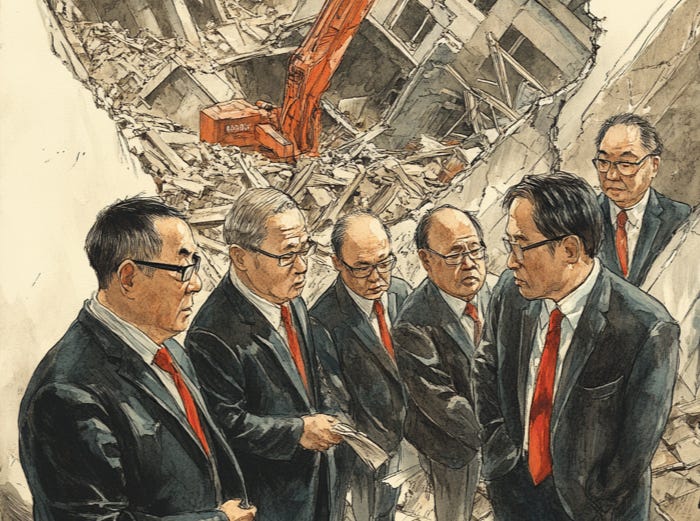
Discover more from China Banking News
How China plans to avoid a protracted Japanese-style property collapse
Chinese industrial policy needs "global perspective" to avoid trade frictions.
Our briefing on critical economic and financial developments in China as of Thursday, 19 September, 2024:
How China plans to avoid a protracted collapse of the the property sector that follows the trajectory of the Japanese real estate crash of the late 1980’s.
China may need to adopt a “global perspective” in the formulation of key economic policies, in order to avoid trade frictions and overcapacity accusations.
How China hopes to avoid a protracted, Japanese-style property collapse
Gao Shanwen (高善文), a researcher from the China Financial 40 Forum think tank, points out that many domestic observers consider China's current property market slump to be akin to the implosion of the Japanese real estate bubble at the end of the 1980's.
A key similarity lies in ongoing price declines alongside the "disappearance of demand."
"In recent years, property market demand has fallen, particularly in the market for new houses,” Gao writes.
"Households have become more conservative in their consumption behaviour and their resource allocation, including allocation to real estate.
"This impact has continued until the present, and is undoubtedly worsening property market adjustments."
Gao points out that China's situation still differs from classic property bubbles, with Beijing pursuing key adjustments in three areas in a bid to alleviate the pain
These include:
The property market transitioning from the "cyclical model of pre-2021", to the “production model” of the future.
In the past, real estate projects were undertaken by large-scale company groups, responsible for the overall allocation of funds and coordination of liquidity between individual projects that were in essence independent legal persons. In future, the focus will be on the projects operating as independent legal persons, responsible for their own management of capital and liquidity.
In the past, pre-sold homes accounted for nearly 90% of all housing sales. In future, China's real estate sector will transition away from this model, to one where most homes sold are pre-existing.
China's industrial policy, macro-economic policy and tax policy needs to adopt global perspective to avoid overcapacity trade disputes
Gao also believes Beijing needs to give greater consideration to international ramifications in the formulation of its industrial policy, in order to avoid worsening trade disputes with other major economies relating to China’s manufacturing overcapacity.
According to Gao, the prevailing view within China is that industrial overcapacity is an "unavoidable issue for emerging sectors undergoing rapid growth."
This stands in contrast to the views of other major economies, that consider Chinese overcapacity to be the result of market distortions arising from industrial policy and fiscal subsidies.
Gao further argues that accusations of overcapacity from other nations will inevitably arise due to political pressures. An example of this is China's recent emergence as a key competitor in the electric vehicle sector, posing major challenges to European and American manufacturers.
"The challenges of this are likely to lead to political implications in other countries...if these pressures cannot be appropriately managed, it can become a threat to the rules-based global free-trade system."
The sheer scale of China's manufacturing sector also makes it liable to accusations of overcapacity when its own domestic demand fails to soak up this supply.
"China's manufacturing sector is undoubtedly the world's largest, equal to nearly the sum of the seven biggest industrial nations combined,” Gao writes.
"This means that when there is volatility in Chinese aggregate demand and aggregate supply, it can impact manufacturing and create spillover effects.
"When these spillover effects have political implications in other countries, this can bring external economic challenges for China."
For this reason, Gao considers it prudent for Chinese policymakers to adopt a more "global perspective" in the formulation of industrial policy, in order to avoid these challenges and risks.
"[These problems] are not consonant with China's interests as the world's leading trading nation."
"As the world's largest manufacturing nation, China must adopted a more global perspective in its thoughts and actions when managing industrial policy, macro-economic policy and tax-collection policy."
Subscribe to China Banking News
We demystify China's macroeconomic policies for thousands of executives and analysts at Bloomberg, J.P. Morgan, The Financial Times, The Wall Street Journal, HSBC and others.








